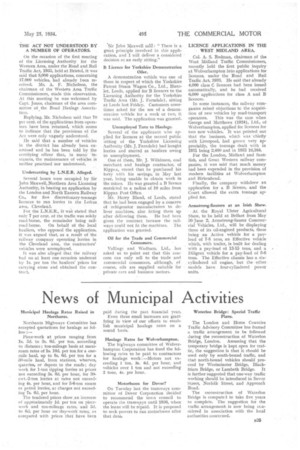THE ACT NOT UNDERSTOOD BY A NUMBER OF OPERATORS.
Page 43

If you've noticed an error in this article please click here to report it so we can fix it.
On the occasion of the first meeting of the Licensing Authority for the Western Area, under the Road and Rail Traffic Act, 1933, held at Bristol, it was said that 8,000 applications, concerning 17,000 vehicles, had already :teen received. Mr. A. F. Nicholson, the chairman of the Western Area Traffic Commissioners, made this observation. At this meeting he was welcomed by Capt. Jones, chairman of the area committee of the Road Haulage Association. — Replying, Mr. Nicholson said that 70 per cent. of the applications from operators have been returned, which seems to indicate that the provisions of the Act were only vaguely understood.
He said that a number of vehicles in the district has already been examined and he has been told by the certifying officer that, in Many instances, the maintenance of vehicles is neither practised nor understood: Undercutting by L.N.E.R. Alleged.
Several hours were occupied by Sir John Maxwell, Northern Area Licensing Authority, in hearing an application by the London and North Eastern Railway Co., for five discretionary-tonnage licences to run lorries in the Loftus area, 'Cleveland.
For the L.N.E.R., it w.aS stated that only 7 per cent, of the traffic was solely road-borne, the remainder being rail road-borne. On behalf of the local hauliers, who opposed the application, it was argued that, as a result of the railway company operating lorries in the Cleveland area, the contractors' vehicles were unemployed.
It was also alleged that the railway had on at least one occasion undercut by 1s. per ton the hauliers' prices for carrying stone and obtained the contract. Sir John Maxwell said : " There is a great principle involved in this application, and I will deliver a considered decision at an early sitting."
B Licence for Yorkshire Demonstration Oiler.
A demonstration vehicle was one of those in respect of which the Yorkshire Patent Steam Wagon Co., Ltd., Hunslet, Leeds, applied for B licences to the Licensing Authority for the Yorkshire Traffic Area (Mr. J. Farndale), sitting at Leeds last Friday. Customers sometimes asked for the use of a demonstration vehicle for a week or two, it was said. The application was granted.
Unemployed Turn to Haulage.
Several of the applicants who applied for licences at the second public sitting of the Yorkshire Licensing Authority (Mr. J. Farndale) had bought lorries and started as hauliers owing to unemployment..
One of them, Mr. J. Wilkinson, coal merchant and haulage .contractor, of Eippax, stated that he purchased his lorry with his savings, in May last year, being unable to obtain work in the mines. He was granted a B licence restricted to a radius of 10 miles from Kippax Post Office.
• Mr. Harry Bland, of Leeds, stated that he had been.engaged by a concern of • refrigerator manufacturers to deliver machines, also fitting them up after delivering them. He had been given the contract because the railways could not fit the machines. The application was granted.
Oil for the Trade and Commercial Consumers.
Vallings and Wadham, Ltd., has asked us to point out that this concern can only sell to the trade and commercial consumers, although, of course, oils are supplied suitable for private cars and business motors. LICENCE APPLICATIONS IN THE • WEST MIDLAND AREA.
Col. A. S. Redman, chairman of the West Midland Traffic Commissioners, recently held the first public inquiry at Wolverhampton into applications for licences, under the Road and Rail Traffic Act, 1933. He said that already 4,000 class C licences had been issued automatically, and he had ieceived 6,000 applications for class A and B licences.
In some instances, the railway companies raised objections to the acquisition of new vehicles by road-transport operators. This was the case when George and Matthews (1924), Ltd., of Wolverhampton, applied for licences for two new vehicles. It was pointed out that the business, which was 'chiefly with Liverpool, had grown very appreciably, the tonnage dealt with in 1931 being 2,480 and in 1933 16,164.
For the London, Midland and Scottish, and Great Western railway companies, it was said that much money had been expended in the provision of modern facilities at Wolverhampton and Birkenhead.
Finally, the company withdrew an application for a B licence, and the Court allowed the extra tonnage applied for.
Armstrong-Saurers at an Irish Show.
At the Royal 'Ulster Agricultural Show, to be held at Belfast from May 80june 2, Armstrong-Saurer Commercial Vehicles, Ltd., will be displaying three of its oil-engined products, these being an Active vehicle for a payload of 7-8 tons, an Effective vehicle which, with trailer, is built for dealing with a pay-load of 13-15 tons, and a Diligent vehicle for a pay-load of 5-6 tons. The Effective chassis hasa. sixcylindered oil engine,but the • other models have four-cy-lindered power units.




































































































